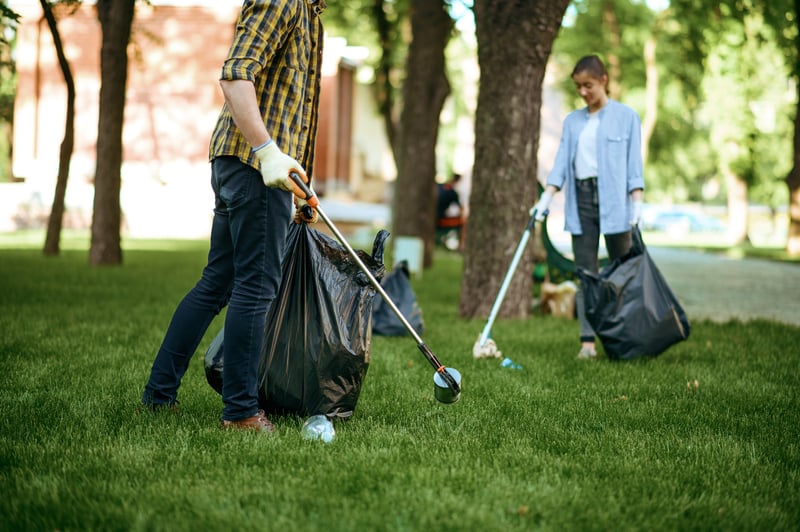Littering is pretty commonplace, unfortunately. Where I live close to Wigan centre, it’s pretty constant, and we’re reliant on volunteers to litter pick for the most part. But it’s not just here, according to Keep Britain Tidy, more than two million pieces of litter are dropped in the UK every day, which is a sorry figure!
Since Covid, the amount of litter did increase with people spending more time outdoors, but also the number of litter pickers has massively increased too. It used to be a lonely old job, but now I’m really encouraged to see people joining in quite regularly – it’s making a big difference!
Still, there needs to be more work to address these behaviours and stop littering in the first place. So education and awareness is key. And unfortunately, the more litter a neighbourhood has, the more it continues to increase, degrading the area further, so we need to act fast.
Litter picking doesn’t receive enough thanks; it is vital! And litter picking not only helps make our neighbourhoods look great visually. But it prevents the many consequences of it staying on the ground.
Thank you so much to anyone who volunteers in our community litter picking!
If you’re on the fence about litter picking, here is a quick overview of what happens to litter that stays on the ground. Every bag you collect prevents all of this.
And if you ever found yourself littering when you couldn’t find a bin, or you couldn’t quite be bothered, here are some excellent reasons to stop littering right now.
Litter Pollution
Most litter you come across is made of plastic and can last for years. Cigarette butts can last ten years, and styrofoam could potentially last for 500 years!!!
Litter doesn’t stay still, wind and rain helps it to travel and move around. Litter also doesn’t stay whole; tiny particles of plastic break off all the time. They’re called microplastics.
Microplastics, although only 5mm or under, can cause havoc to the environment in many ways.
They can enter the waterways, either directly through rivers and canals or through the sewers. Some of this water flows directly to the oceans, affecting both life on land and sea life. Wigan’s problem of litter doesn’t stay in Wigan at all.
Trace amounts of plastic are found in fresh drinking water and are even now in our bodies!
Plastic litter can also release potentially harmful chemicals into the soil and waterways, spreading and contaminating them. For example, cigarette butts release arsenic, amongst other toxic chemicals.
Microplastics and chemicals can seep into the ground, affecting groundwater, which animals rely on.

Danger to Wildlife
Litter is also incredibly dangerous for animals. The RSPCA receive on average 14 calls a day regarding animals being endangered by litter.
Animals may mistake it for food and try to eat it, giving them bellies full of plastic. This negatively affects them in a few ways. Again, toxic chemicals are released into their bodies, they may have reduced mobility (and unable to escape predators) and because it takes up space in their stomachs, it reduces their ability to eat real food so that they die a slow and painful death.
Balloons, in particular, are known for this; as all balloons that fly off do come down at some point, balloon releases are inadvertently littering on a large scale. I don’t recommend balloon releases for any occasion. There are other ways to celebrate or memorialise someone you love.
Wildlife can also become entangled in it, for example, plastic bags, and they can get caught up inside and choke.
Sharp objects like glass or cans are a hazard to humans and animals alike, and can cause serious injury.
What can you do?
You can litter pick in your area. In Wigan Borough, the council offers a free litter picking kit, so you have all you need to get started.
It usually includes safety gloves, bags and a litter picking stick. They will also collect the waste if you leave it next to a public bin.
Plastic is a bigger problem in general. Even when we put our litter in the bin or recycle it, it’s often burned (as it’s relatively difficult to recycle) and so releasing potentially toxic fumes into the air, contributing to air pollution. If you would like to use less plastic then, we have a blog post to help you.

Local Litter Picking Groups
If you don’t fancy going out alone, there are many local litter picking groups on Facebook where you can feel inspired by other neighbours’ actions and organise clean-ups.
These online and offline litter picking communities help motivate people to litter pick and reduce littering in the first place.
Wigan Litter Pickers – facebook.com/groups/327768262001773
Leigh Litter Pickers – facebook.com/groups/2492827411025866
Hindley Green and Hindley Litter Pickers – facebook.com/groups/429920371620729
Abram Litter Pickers #LitterHeroes – .facebook.com/groups/246702783413883
Keep Atherton Tidy – facebook.com/groups/795130270576413
If you would like more information on wildlife gardening, or want to keep up with more of our news, get in touch on either our Facebook page, Instagram, or email

Leave a Reply